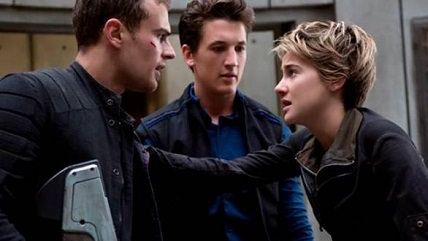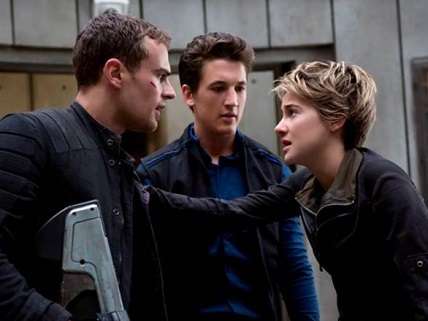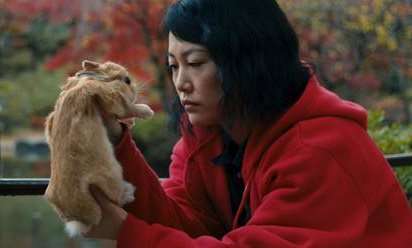Movie Reviews: Insurgent and Kumiko Fail to Impress
Shailene Woodley in a sub-par sequel and Rinko Kikuchi in an overhyped Sundance item.


Those who love Veronica Roth's bestselling books may be distressed to learn that Insurgent, the sequel to last year's dystopian megaplex hit Divergent, takes major liberties with the Roth novel on which it's based. Or so I'm told by a colleague long conversant with the author's young-adult Divergent trilogy. I won't detail the changes my informant lists, but will note that a mysterious box has been inserted into the story that fans won't remember from the novel, because it's not there. Some readers may be annoyed by such jarring cinematic adjustments, but as I suppose the filmmakers might respond, so what?
Surprisingly, for a sequel to a movie that grossed more than a quarter-billion dollars worldwide, a new creative crew has been brought in here—new director, writers, cinematographer, production designer, composer. The result is a movie that suffers not only from the usual stuck-in-the-middle problems of the second installment of many trilogies (think The Matrix Reloaded, not The Empire Strikes Back), but also from a lack of the plot clarity and kinetic thrust that kept the first picture from being a pure Hunger Games knockoff. The narrative is muddled here, and there are scenes of achingly dull discourse. Worse yet, the movie fritters away its most potent asset, Shailene Woodley, returning as the scrappy teen rebel Tris.
Once again we are in post-apocalyptic Chicago, 200 years after a war of some sort reduced the city to a rubbly metropolis ringed around by a towering wall. (In the last movie—just five days ago in the story's chronology—the war was 100 years in the past.) You'll recall that the citizens inside the wall all know their place, because they've each been assigned to one of five groups. The members of Abnegation are selfless, those in Candor are honest, the Dauntless are brave, the Erudite are brainy, and the folks in Amity are peace-loving hippies. Tris is different. She's Divergent, incorporating traits of more than one faction, and is thus considered an enemy of the ordered society currently overseen by Erudite leader Jeanine (frosty Kate Winslet). At the end of the previous film, Tris and a band of friends fled the city for their lives. Remember?
Okay. Now, as Insurgent begins, we find Tris and her fellow refugees—including hunky boyfriend Four (Theo James), ambiguous brother Caleb (Ansel Elgort), and freelance weisenheimer Peter (Miles Teller)—being rousted from among the goats and gardens of a rural Amity settlement where kindly leader Johanna (Octavia Spencer) has given them shelter. Fleeing Jeanine's storm troopers, the kids hop a train bound for the city, where they end up at the underground headquarters of the Factionless, a disgruntled community overseen by Four's long-lost mother Evelyn (Naomi Watts), who's plotting to depose Jeanine and seize the reins of power herself.
Jeanine of course has her own plans. She believes the aforementioned mysterious box will help consolidate her rule. Unfortunately, it can only be opened by a Divergent—in fact, by the most powerful of all Divergents. "The One," you might say. Whom that might be is a question that will occur to no one.
We know this story is going to leave us hanging, and there's not much director Robert Schwentke can do about that. Some of the actors on hand seem, like us, to be marking time. The movie could have used a little more of Miles Teller's virtuoso sarcasm and Naomi Watts' oblique menace. And it's disappointing to see Woodley so fenced in by the truncated plot. Her Tris is a hero who hasn't fully come into her heroism, and she spends a lot of the movie in woebegone reverie. The effects in this movie are oddly conceived (people and objects sometimes flake away into what could be clouds of CGI dandruff), but Woodley has one memorable action scene, racing around on the outside of a burning house as it tumbles through the air; and her face-off against a dark replica of herself is a reminder of her technical skill. But she's too good for such middling material.
The movie holds forth a promise that the story will liven up in its final installment, Allegiant—which, in the usual profit-maximizing franchise manner, will be split into two parts for parceling out over the next two years. Could be interesting, I suppose. To get to that wrapup, though, you'll first have to get through this.

Kumiko: The Treasure Hunter
Some art movies are so subtle you have to work to get what's going on in them, and afterward you're glad you did. Others (Jim Jarmusch's The Limits of Control and Nicolas Winding Refn's Only God Forgives leap to mind) turn out to be bogus—there's nothing to get. David Zellner's Kumiko: The Treasure Hunter, a vaporous Sundance hit, is one of those.
The movie is constructed around the Coen brothers' 1996 film Fargo. It begins in Japan, with a woman walking along a beach. She's holding a map that leads her to a small cave. Stepping inside, she finds a rock, lifts it up, and withdraws a waterlogged VHS tape. Returning to her cramped apartment, she slips the tape into a VCR machine and begins playing it with no problem. (This is the second of the movie's several curiosities; the first is where the map that led her to the tape came from.)
The woman's name is Kumiko (Rinko Kikuchi), and the movie she begins watching is Fargo. She's fixated on one scene—the part where Steve Buscemi buries a briefcase filled with nearly a million dollars alongside a wire fence in a vast snowfield. Playing this scene over and over, she takes notes on it, and uses a tape measure to calculate distances on the screen. She fashions a needlepoint map. She shares a cup of noodles with her pet rabbit. The rabbit's name is Bunzo.
Kumiko is a glum, bedraggled Tokyo office drone, disdained by her coworkers and disliked by her boss. She speaks virtually no English, but one day, after abandoning Bunzo, she boards a flight to Minneapolis. Upon arrival she gets on a bus, and is soon underway to Fargo, North Dakota, where she intends to locate Buscemi's cash-packed briefcase. Apparently she neglected to watch more than that one scene in the Coens' movie; had she done so, she would know that Buscemi actually buried his treasure in Minnesota.
Many things begin to frustrate Kumiko's desire to reach Fargo, few of them gripping. (This is a road movie that's mostly road.) A number of quirky characters crop up—a helpful old lady, a sympathetic cop (played by director Zellner). The landscape through which Kumiko passes is bleak and snowy. At one point, checked into a roadside motel, she cuts up a quilt and dons it for warmth. This puffy garment suggests a Japanese ceremonial robe, possibly a traditional wedding dress. If that resemblance was intended, the purpose, like so much else in this film, is unclear. The movie ends with a fairytale flourish, which you will be forgiven for finding ridiculous.
Rinko Kikuchi, who was nominated for an Oscar for her supporting performance in the 2006 Babel, used a character's minimal knowledge of English for tart comic effect in Rian Johnson's undervalued 2008 film, The Brothers Bloom. Here, though, confined by a script written by Zellner and his brother, Nathan, she's unable to project anything beyond mute dejection. Kumiko doesn't seem like a woman following her dream; she's clearly mentally ill. This in turn recalls Roman Polanski's Repulsion, which also featured a near-catatonic female protagonist, and a rabbit as well. (Although the more-fortunate Bunzo doesn't wind up rotting on a plate.) But Polanski's film was a horror story. This isn't, and Kumiko's dark nature sits awkwardly amid these more lighthearted goings-on. We're meant to care about this sullen woman, but after nearly two hours it's still not clear why we should.
Editor's Note: As of February 29, 2024, commenting privileges on reason.com posts are limited to Reason Plus subscribers. Past commenters are grandfathered in for a temporary period. Subscribe here to preserve your ability to comment. Your Reason Plus subscription also gives you an ad-free version of reason.com, along with full access to the digital edition and archives of Reason magazine. We request that comments be civil and on-topic. We do not moderate or assume any responsibility for comments, which are owned by the readers who post them. Comments do not represent the views of reason.com or Reason Foundation. We reserve the right to delete any comment and ban commenters for any reason at any time. Comments may only be edited within 5 minutes of posting. Report abuses.
Please to post comments


I've made $64,000 so far this year working online and I'm a full time student. I'm using an online business opportunity I heard about and I've made such great money. It's really user friendly and I'm just so happy that I found out about it. Heres what I've been doing,
http://www.work-cash.com
I have to wonder how clueless Jeb and Hillary are. Or is it me?
All hail Gorthan! Do it! Do it NOW!
It's me! That was supposed to be a morning links comment. I haven't watched a movie in 20 years.
The first one wasn't bad. It was better than the last installment of the Hunger Games.
In the last installment of the Hunger Games, the evil dictator forgoes an opportunity to destroy the insurgency--so he can focus on destroying the protagonist's relationship with her boyfriend instead.
Insurgent was kinda cool in that it had a part that was sort of like '70s Invasion of the Body Snatchers, where in order to survive, the protagonists had to pretend they were brainwashed zombies.
Incidentally, that's sort of how I feel as a Gen X guy goin' to the movies, these days. In order to halfway enjoy anything I see, I have to pretend I'm Millennial level dumb. Either that or go with a really...nice girlfriend. She's definitely worth having to sit through two hours of shit.
Incidentally, that's sort of how I feel as a Gen X guy goin' to the movies, these days. In order to halfway enjoy anything I see, I have to pretend I'm Millennial level dumb.
This is one of the key indicators when you know you're no longer in the demographic that movie makers are targeting: when you find youself having to suspend disbelief to ridiculous levels in order to halfway enjoy a movie.
Yup. After realizing it had been two years since I went and watched a movie at the theater, that's when I knew I had fallen out of the "coveted" 18-45 year old demographic that advertisers love. Apparently advertisers love people who like to buy things they see in shitty movies...I, on the other hand, don't want to spend $20 on a bad film filled with advertising. I can wait until it goes on Netflix or HBO.
Millennials are so derptastic . . . it's all about perpetual adolescence. That's one of the reasons we've hit cultural stagnation mode, in art, fashion and just about everything else. One generation after another "grew up" and allowed the younger up-and-comers to replace them and redefine what was hip, cool, etc. No more. We are all perpetually 13 years old now. I also blame hip-hop.
Gorthan pictured here.
Now you know how your parents felt when they had to take you to shitty teenager movies in the 1980s. 🙂
This is a complaint that every generation makes about the one that follows it.
Aww, I was hoping Loder would excoriate The Gunman here. I've almost never wanted a movie to tank so bad.
It's prepping me for Superman vs. Batfleck, which I hope fails harder than anything in the history of failing.
Divergent was such a bad movie that I was astounded they actually made the second movie.
I only saw the trailer, but one thought was enough to dissuade me from going to it - why are beauty salons apparently the only thing left after the apocalypse vanquishes everything else? Show me a post apocalyptic movie where they lead characters aren't all perfectly coiffed and maybe I'll consider seeing it. Say what you want about Waterworld, at least they didn't all look like extras from Zoolander.
Yup. Same reason I tuned out of Revolution on NBC. In a world without electricity, if people still look about the same as they would when electricity existed, it's too much disbelief for me to suspend.
I make up to $90 an hour working from my home. My story is that I quit working at Walmart to work online and with a little effort I easily bring in around $40h to $86h Someone was good to me by sharing this link with me, so now i am hoping i could help someone else out there by sharing this link... Try it, you won't regret it!....
....................................... http://www.NavJob.com